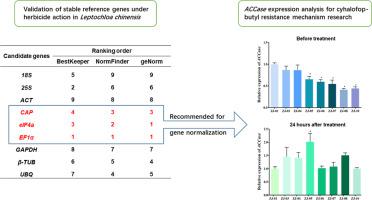当前位置:
X-MOL 学术
›
Pestic. Biochem. Phys.
›
论文详情
Our official English website, www.x-mol.net, welcomes your
feedback! (Note: you will need to create a separate account there.)
Reference genes for the study of herbicide stress responses in Leptochloa chinensis (L.) Nees and estimation of ACCase expression in cyhalofop-butyl resistant populations
Pesticide Biochemistry and Physiology ( IF 4.2 ) Pub Date : 2021-01-01 , DOI: 10.1016/j.pestbp.2020.104739 Yi Zhang , Liping Chen , Wen Song , Tao Cang , Mingfei Xu , Guojun Zhou , Changxing Wu
Pesticide Biochemistry and Physiology ( IF 4.2 ) Pub Date : 2021-01-01 , DOI: 10.1016/j.pestbp.2020.104739 Yi Zhang , Liping Chen , Wen Song , Tao Cang , Mingfei Xu , Guojun Zhou , Changxing Wu

|
Cyhalofop-butyl resistance in Leptochloa chinensis (L.) Nees is a threat to rice production. Qualitative changes to the acetyl-CoA carboxylase gene (ACCase) have been reported to induce cyhalofop-butyl resistance in some weed species, but the role of ACCase in cyhalofop-butyl resistance through quantitative changes remains uncertain. The accurate assessment of transcriptional changes in the functional genes associated with herbicide resistance in L. chinensis is challenging owing to the lack of available reference genes for expression normalization. Here, we selected nine candidate reference genes in L. chinensis and assessed their transcription stability in populations susceptible and resistant to cyhalofop-butyl. Transcription stability was compared under conditions of herbicide stress and control conditions using BestKeeper, NormFinder, and geNorm. Elongation factor 1 alpha, eukaryotic initiation factor 4A, and cap-binding protein CBP20 were the most stable reference genes under cyhalofop-butyl treatment. Transcription levels of ACCase were evaluated in seven resistant populations, one of which showed higher transcription than the susceptible population after 24 h cyhalofop-butyl treatment. However, the slight up-regulation of ACCase (approximately 2.0-fold) is unlikely to be responsible for the high resistance levels in these populations of L. chinensis.
更新日期:2021-01-01











































 京公网安备 11010802027423号
京公网安备 11010802027423号